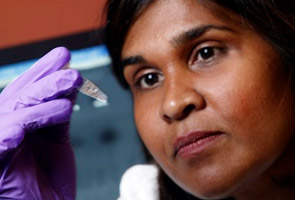INTERNATIONAL
Daily-dose HIV prevention fails for African women


Daily doses of drugs or vaginal gels have proven ineffective at preventing HIV infections in southern Africa, a study out Monday revealed, saying most of the women failed to use them as directed.
"Although there may be other explanations for why these products don't always work to prevent HIV, it's hard to ignore the fact that that so few women in our study used them," said Jeanne Marrazzo, who reported the results from more than 5,000 women in 15 trial sites in Uganda, South Africa and Zimbabwe at a conference in Atlanta.
Blood tests detected the medication was present in fewer than a third of the study participants assigned to take an oral dose of Truvada or tenofovir antiretroviral drugs, and in less than a quarter assigned to apply the tenofovir as a gel.
And the women least likely to take the drugs as directed were unmarried women under 25 -- the women at highest risk of HIV infection.
"Clearly, an approach of daily product use is not going to work for the population of women who participated in VOICE," she said, referring to the study that had been dubbed "Vaginal and Oral Interventions to Control the Epidemic."
Previous clinical trials, among other population sectors, had shown that a daily dose of Truvada or tenofovir works well to the risk of HIV infection.
But even highly effective drug treatments will fail if they aren't used, emphasized fellow researcher Zvavahera Mike Chirenje of the University of Zimbabwe in Harare.
Another researcher, Sharon Hillier, suggested that "products that are long-acting, such as the dapivirine vaginal ring, which we are evaluating in the ASPIRE study, and that women use for a month at a time, may be more suitable for this vulnerable population."
If the results of the trial were disappointing, the researchers said they underlined the importance of finding a better prevention strategy for these women.
"The women in our study -- especially in South Africa -- experienced rates of HIV acquisition that were much higher than we expected," Marrazzo said.
Just under nine percent of unmarried women under age 25 were HIV positive, the study found, far higher than the less than one percent of older, married women.
"The bottom line is that this group of young women remains at very high risk of HIV infection, and urgently needs safe, effective and practical HIV prevention methods that they will actually use," she added.
"Although there may be other explanations for why these products don't always work to prevent HIV, it's hard to ignore the fact that that so few women in our study used them," said Jeanne Marrazzo, who reported the results from more than 5,000 women in 15 trial sites in Uganda, South Africa and Zimbabwe at a conference in Atlanta.
Blood tests detected the medication was present in fewer than a third of the study participants assigned to take an oral dose of Truvada or tenofovir antiretroviral drugs, and in less than a quarter assigned to apply the tenofovir as a gel.
And the women least likely to take the drugs as directed were unmarried women under 25 -- the women at highest risk of HIV infection.
"Clearly, an approach of daily product use is not going to work for the population of women who participated in VOICE," she said, referring to the study that had been dubbed "Vaginal and Oral Interventions to Control the Epidemic."
Previous clinical trials, among other population sectors, had shown that a daily dose of Truvada or tenofovir works well to the risk of HIV infection.
But even highly effective drug treatments will fail if they aren't used, emphasized fellow researcher Zvavahera Mike Chirenje of the University of Zimbabwe in Harare.
Another researcher, Sharon Hillier, suggested that "products that are long-acting, such as the dapivirine vaginal ring, which we are evaluating in the ASPIRE study, and that women use for a month at a time, may be more suitable for this vulnerable population."
If the results of the trial were disappointing, the researchers said they underlined the importance of finding a better prevention strategy for these women.
"The women in our study -- especially in South Africa -- experienced rates of HIV acquisition that were much higher than we expected," Marrazzo said.
Just under nine percent of unmarried women under age 25 were HIV positive, the study found, far higher than the less than one percent of older, married women.
"The bottom line is that this group of young women remains at very high risk of HIV infection, and urgently needs safe, effective and practical HIV prevention methods that they will actually use," she added.
#drug
#HIV
#infections
#South Africa and Zimbabwe
#southern Africa
#Uganda
#Vaginal and Oral Interventions to Control the Epidemic
#women
